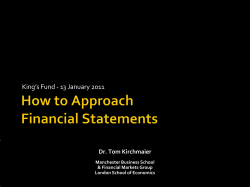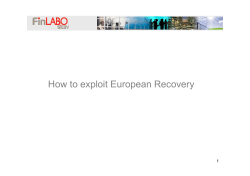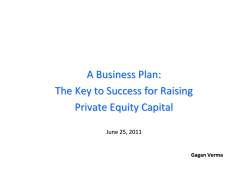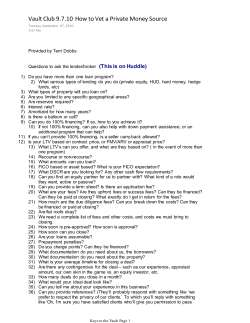
Almost everything you read below was discovered by, created by,... www.showmetheloan.net and/or his group of friends and researchers.
WHY USE AN “ACTION TO QUIET TITLE” TO SAVE YOUR HOME Almost everything you read below was discovered by, created by, researched by; John Stuart of www.showmetheloan.net and/or his group of friends and researchers. Although numerous other people are using or have used these concepts effectively they may not work for you if you do not understand how to operate in law and in court; especially if you add ANY of that stupid pay-the-idiot pay-tri-idiot useless stuff. 1. 2. 3. 4. 5. 6. DISCLAIMERS: THIS IS NOT LEGAL ADVICE; its just education material by a layman for laymen I AM NOT AN ATTORNEY; YOU CAN FORWARD THIS TO ANYONE AND/OR EVERYONE; IF YOU ARE PART OF SOME PAY-THE-IDIOT GROUP and/or PAY-TRI-IDIOT GROUP and/or YOU RECEIVE THIS FROM A PAY-THE-IDIOT GURU, HE STOLE THIS FROM ME and/or MY GROUP AND IS LYING TO YOU ABOUT EVERYTHING, DO NOT USE WHAT HE SELLS YOU, IF YOU DO YOU WILL PROBABLY GO TO PRISON; THIS DOCUMENT IS INCOMPLETE, IT ONLY SPELLS OUT THE BASICS, COURT STINKS, IT ALWAYS STINKS AND IT STINKS A LOT, IN MOST STATES THE JUDGES’ PENSION FUND IS DERIVED FROM STEALING PEOPLES’ HOMES, THAT MAKES THINGS A LOT HARDER; IF YOU DO NOT GO AND WATCH TRIALS AND PRACTICE BEING IN COURT; WHEN YOU WALK PAST THAT LITTLE FENCE EXPECT YOUR BOWELS TO TIGHTEN, YOUR MOUTH TO CLOSE, YOUR HEART TO SPEED UP AND EXPECT TO LOSE BECAUSE YOU WERE NOT PREPARED. A lot of lawyers, laymen-pro se, pay-the-idiot and pay-tri-idiot gurus have tried a lot of different ways to stop foreclosures. I will not waste my time discussing the morons’ way of doing things since; as always, NONE of the pay-tri-idiot ways work: A4V, EFT, Reconveyance, Promissory Notes, Bonds etc., are just useless documents written by con men to sell to people that are so desperate and scared they will try anything and follow anyone. Damn ALL of those pay-tri-idiot scum bags to the hell from whence they came. But, for your understanding, I need to discuss why what the lawyers and educated laymen-pro se’s have done that has not worked, and why the attempts at using the courts have failed. I will include Black’s Law Dictionary Sixth Edition definitions when appropriate [as noted with a (B6)], otherwise I will use Standard English parlance. An Action to Quiet Title may only be as effective as your documents; therefore you should file your notary complaints (see: www.notarycomplaint.com), file the 3949A’s for the 1099A’s, and obtain a complete and accurate forensic exam and/or audit as part of efforts to keep your home. In law, there is a difference between “An Action to Quiet Title” and “A Quiet Title Action.” You need to decide which applies in your case. 1 I. VERY IMPORTANT BEFORE YOU FILE ANY SUIT In most States: you MUST FIRST serve the entity you are going to sue with a NOTICE OF INTENT of some type. Check your State statutes. Normally this must be inclusive of a Quit Claim Deed and a money order for $10 or more. If they sign the Quit Claim Deed and cash the money order, game over, no need for court. If they do not; then you can proceed with a suit. If you do not do the NOTICE first your case shall be dismissed, probably with prejudice. You lose! (B6) Quitclaim deed. A deed of conveyance operating by way of release; that is, intended to pass any title, interest, or claim which the grantor may have in the premises, but not professing that such title is valid, nor containing any warranty or covenants for title. In a number of states, a deed which purports to transfer nothing more than interest which grantor may have, if any, at time of transaction, and excludes any implication that he has any title or interest in described realty. Sabine Production Co. v. Guaranty Bank & Trust Co., La.App. 1 Cir., 432 So.2d 1047, 1052. Under the law of some states the grantor warrants in such deed that neither he nor anyone claiming under him has encumbered the property and that he will defend the title against defects arising under and through him, but as to no others. Compare Warranty deed. II. WHAT IS AN ACTION TO QUIET TITLE / QUIET TITLE ACTION A. QT explained: QT is probably one of the most aptly named suits in law. An Action to Quiet Title is a procedure in court (an action) wherein one party claiming ownership moves a court (through a judicial decision) to “quiet the title.” The “noise” on the Title is inclusive of, but not limited to: clouds, claims, liens, lis pendens, etc. Basically you are asking a judge to look over everything and interpret every claim and decide who the actual owner of the real property is. B. Difference between QT suits and other cases: 1. In a QT, false and/or forged document are NOT PRESUMED to be valid. In fact, there are no true PRESUMPTIONS in QT unless the respondent/defendant fails to appear; in which case the court PRESUMES the filer (plaintiff) is correct in all aspects. Note: WHEREAS in all other cases all documents are PRESUMED to be valid! 2. QT is not about monetary damages, it is about “equitable relief.” (B6) Equitable relief. That species of relief sought in a court with equity powers as, for example, in the case of one seeking an injunction or specific performance instead of money damages. (B6) Cloud on title. An outstanding claim or encumbrance which, if valid, would affect or impair the title of the owner of a particular estate, and on its face has that effect, but can be shown by extrinsic proof to be invalid or inapplicable to the estate in question. Best Inv. Co. v. Parkhill, Tex.Civ.App., 429 S.W.2d 531, 534. A conveyance, mortgage, judgment, tax-levy, etc., may all, in proper cases, constitute a cloud on title. Newpar Es Estates, Inc. v. Barilla, 161 N.Y.S.2d 950, 952. The remedy for removing a cloud on title is usually the means of an action to quiet title. See Quiet title action. 2 (B6) Quiet title action. A proceeding to establish the plaintiff's title to land by bringing into court an adverse claimant and there compelling him either to establish his claim or be forever after estopped from asserting it. See also Action to quiet title; Cloud on title. (B6) Action to quiet title. One in which plaintiff asserts his own estate and declares generally that defendant claims some estate in the land, without defining it, and avers that the claim is without foundation, and calls on defendant to set forth the nature of his claim, so that it may be determined by decree. It differs from a "suit to remove a cloud," in that plaintiff therein declares on his own title, and also avers the source and nature of defendant's claim, points out its defect, and prays that it may be declared void as a cloud on plaintiffs estate. It embraces every sort of a claim whereby the plaintiff might be deprived of his property or his title clouded or its value depreciated, or whereby the plaintiff might be incommoded or damnified by assertion of an outstanding title already held or to grow out of the adverse pretension. Bank of American Nat. Trust & Savings Ass'n v. Town of Atherton, 60 Cal.App.2d 268, 140 P.2d 678, 680. See Cloud on title. III. WHY QT WORKS / WHY OTHER CASES DON’T WORK A. Rule 1 in life, in court, in relationships: PRESUMPTIONS ARE EVERYTHING. B. In almost all cases, except QT, all documents entered as evidence, especially documents entered by a bank, are PRESUMED valid. C. Invalidating a PRESUMPTION is almost completely impossible; it is like proving a negative. Note, ie: “…you must now provide enough evidence to everyone to prove you have stopped beating your wife!...” What, you can’t, and the allegation in the demand PRESUMES you are guilty. Brothers and sisters, THAT IS LAW! Be ready. It’s a lot better when you are making the other party provide the evidence. D. In QT, there is a complete absence of PRESUMPTIONs in favor of the defendant/respondent, each party may be required to evidence their claim(s) but ONLY if the defendant/respondent makes a very good case. E. In most QT cases, the banks don’t even show up! We all know why! The banks rely completely on “…false and/or forged documents filed into a public office…” (see: type that statement into your state law search for the appropriate statute), which if filed into a court case where the documents are examined may lead to felony charges against the provider of the documents and sanctions against the lawyer for entering the documents into court without verifying the documents validity. 3 IV. WHY DOCUMENTS MATTER IN QT AND NOT IN OTHER CASES A. The Doctrine of Legal Acumen The Doctrine of Legal Acumen is simply legalese meaning if you want to discuss the validity of documents concerning real property and a party’s interest therein, you should do so in a quiet title case and use evidence obtained form sources outside (extrinsic) to the court and/or case. (B6) Legal acumen /liygal akyliwman/. The doctrine of legal acumen is that if a defect in, or invalidity of, a claim to land is such as to require legal acumen to discover it, whether it appears upon the face of the record or proceedings, or is to be proved aliunde, then the powers or jurisdiction of a court of equity may be invoked to remove the cloud created by such defect or invalidity. B. Aliunde Just a “lawyer” word for evidence and/or inferences extrinsic to the item itself. In other words, to prove the document is false and/or forged you might need the original, a hand writing expert, a certified copy of the recorded document, etc. (B6) Aliunde /eyliyondiy/. Lat. From another source; from elsewhere; from outside. Evidence aliunde. Evidence from outside, from another source. In certain cases a written instrument may be explained by evidence aliunde, that is, by evidence drawn from sources exterior to the instrument itself, e.g., the testimony of a witness to conversations, admissions, or preliminary negotiations. Evidence aliunde (i.e., from outside the will) may be received to explain an ambiguity in a will. See Parol evidence. (B6) Aliunde rule /eyliyondiy rilw1/. A verdict may not be impeached by evidence of juror unless foundation for introduction thereof is first made by competent evidence aliunde, or from some other source. State v. Adams, 141 Ohio St. 423, 48 N.E.2d 861, 863. (B6) Parol evidence. Oral or verbal evidence; that which is given by word of mouth; the ordinary kind of evidence given by witnesses in court. In a particular sense, and with reference to contracts, deeds, wills, and other writings, parol evidence is the same as extraneous evidence or evidence aliunde. See also Aliunde; Extraneous evidence; Oral evidence. C. Equity So much damage and insanity has been caused to our society by pay-tri-idiot and pay-theidiot scum bag morons who have a million illicit and ignorant comments and usages for this little word. Not one of them knows what it means, understands it, is capable of adhering to its principles or can explain it. But boy can they sell crap for it! They talk about “courts of equity” yet can’t find one, because there aren’t any in the U.S, laddy dah! We have civil courts that can grant “equitable relief” (see: page 2). If you hear one of these carpetbaggers mention “equity”, run like the wind, they are full of crap and will teach you 4 useless crap that will turn you into a pay-tri-idiot zombie, you may never wake up from that type of insanity. I see it everyday. We had English type Chancery courts, they became equity courts, now all of that has been abolished and we have “civil court” to determine “equitable relief” when appropriate. That’s the way it is, it doesn’t matter if you like, and it doesn’t matter that you don’t understand it, it is what it is, deal with it and quit listening to those insane morons trying to sell you stupid stuff; or lose every case, your home, your spouse and your sanity! (B6) Equity. Justice administered according to fairness as contrasted with the strictly formulated rules of common law. It is based on a system of rules and principles which originated in England as an alternative to the harsh rules of common law and which were based on what was fair in a particular situation. One sought relief under this system in courts of equity rather than in courts of law. The term "equity" denotes the spirit and habit of fairness, justness, and right dealing which would regulate the intercourse of men with men. Gilles v. Department of Human Resources Development, 11 Cal.3d 313, 113 Cal.Rptr. 374, 380, 521 P.2d 110. Equity is a body of jurisprudence, or field of jurisdiction, differing in its origin, theory, and methods from the common law; though procedurally, in the federal courts and most state courts, equitable and legal rights and remedies are administered in the same court. See Equity, courts of. A system of jurisprudence collateral to, and in some respects independent of, "law"; the object of which is to render the administration of justice more complete, by affording relief where the courts of law are incompetent to give it, or to give it with effect, or by exercising certain branches of jurisdiction independently of them. (B6) Natural equity. A term sometimes employed in works on jurisprudence, possessing no very precise meaning, but used as equivalent to justice, honesty, or morality in business relations, or man's innate sense of right dealing and fair play. Inasmuch as equity, as now administered, is a complex system of rules, doctrines, and precedents, and possesses, within the range of its own fixed principles, but little more elasticity than the law, the term "natural equity" may be understood to denote, in a general way, that which strikes the ordinary conscience and sense of justice as being fair, right, and equitable, in advance of the question whether the technical jurisprudence of the chancery courts would so regard it. (B6) Court of Equity. A court which has jurisdiction in equity, which administers justice and decides controversies in accordance with the rules, principles, and precedents of equity, and which follows the forms and procedure of chancery; as distinguished from a court having the jurisdiction, rules, principles, and practice of the common law. Equity courts have been abolished in all states that have adopted Rules of Civil Procedure; law and equity actions having been merged procedurally into a single form of "civil action". Fed.R. Civil P. 2. See also Court of Chancery. (B6) Court of Chancery. A court administering equity and proceeding according to the forms and principles of equity. In England, prior to the Judicature Acts of 1925 (whereby the Court was superseded by the Chancery Division), the style of the court possessing the largest equitable powers and jurisdiction was the "High 5 Court of Chancery." By the Supreme Court of Judicature Act, 1925, all three divisions of the High Court administer both law and equity. See now, Supreme Court Act, 1981, § 49. In some of the United States, the title "court of chancery" is applied to a court possessing general equity powers, distinct from the courts of law. Courts of chancery (equity courts) have been abolished by all states that have adopted Rules of Civil Procedure. See also Court of Equity. (B6) Equity courts and law courts. The former being such as possess the jurisdiction of a chancellor, apply the rules and principles of chancery (i.e. equity) law, and follow the procedure in equity; the latter, such as have no equitable powers, but administer justice according to the rules and practice of the common law. Under Rules of Civil Procedure, however, equity and law have been merged at the procedural level, and as such this distinction no longer exists in the federal courts nor in most state courts, though equity substantive jurisprudence remains viable. Fed.R.Civil P. 2. See Court of Chancery; Court of Equity. V. WHEN TO DO A QT Now! 1. QT takes precedence over all other cases in most states. It may stop a sale, a foreclosure, a forcible detainer, writs of restitution and/or execution, etc. It may and/or can be merged with BK cases if filed in USDC. 2. If you are “not behind” in your “mortgage”; the home is “paid off”, etc., who knows what is going to happen since the banks are taking homes they never loaned money on. I would do QT on everything! A. VI. WHY DO QT Because it’s your home, it’s your country, it’s your family, it’s your spouse. The banksters are stealing EVERYTHING and they are doing it in that order. Fight like you have a spine, stand up like a man, put down the remote, quit your whining, and grow up; or bend down and the lick the boots of your new owners so they will give you enough crumbs to survive long enough to dig the graves for children and clean the stalls in your wives new lover’s stables. VII. HOW TO DO QT A. Don’t use any of those pay-the-idiot pay-tri-idiot moron copies of my teachings, they always screw crap up and you will lose and may go to jail. B. Learn everything you can from www.showmetheloan.net and do it yourself. C. Hire an attorney and show him our stuff, do the documents yourself and just have him do the filings and talking in court. D. Use the attorneys listed on www.showmetheloan.net to get the documents from, then do it yourself or hire a local attorney to use the documents and talk for you in court. 6 FROM THE ORIGINAL AUTHOR, John C. Stuart: This document is hereby entered into the public domain by its sole and exclusive author; for the good of the body politic and our country, all copyrights are hereby forsaken. Author accepts no liability for its usage and/or any alterations made by any party are done so with agreement that said altered document shall not be copyrighted and said author shall acknowledge on said alterations that said document is plagiarized from the original writing by John Stuart. If you learned from this document, and you did, you are requested and encouraged to donate to the writer. If you choose to donate may you receive blessings for your honesty and integrity, if you choose not to donate or to use this document and the efforts of the writer for your own profit without equal remuneration to the original writer, shall you be cursed. To donate: go to www.showmetheloan.net and click on DONATE; or mail (preferable a USPS money order) to: John C. Stuart 4101 West Union Hills Drive, Apartment 1043, Glendale, Arizona (85308). by my hand and seal DATED this 20th day of March, 2012. By /s/ , without prejudice John C. Stuart, sui juris 7
© Copyright 2025










